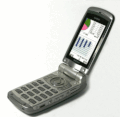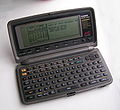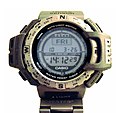Casio: Difference between revisions
No edit summary |
|||
| Line 47: | Line 47: | ||
* 2002 The EX-S1, the first [[Exilim]] digital camera is released. |
* 2002 The EX-S1, the first [[Exilim]] digital camera is released. |
||
* 2007 The OCW-S1000J, dubbed the Oceanus "Manta", is released, being the world's thinnest solar-powered [[chronograph]] at approx. 8.9 mm in thickness. |
* 2007 The OCW-S1000J, dubbed the Oceanus "Manta", is released, being the world's thinnest solar-powered [[chronograph]] at approx. 8.9 mm in thickness. |
||
* 2011 Casio |
* 2011 Casio's CEO DCC Arun N released the [[Casio Prizm]] (fx-CG10/fx-CG20), a full-color [[graphing calculator]]. |
||
'''Chronology of Selected Main Products'''<ref>[http://world.casio.com/corporate/history/chronology/ Chronology of Main Products]</ref> |
'''Chronology of Selected Main Products'''<ref>[http://world.casio.com/corporate/history/chronology/ Chronology of Main Products]</ref> |
||
Revision as of 15:04, 28 April 2014
| Company type | Public |
|---|---|
| TYO: 6952 | |
| Industry | Electronic engineering |
| Founded | 1 June 1957 (Casio Computer Co., Ltd.) April 1946 (Kashio Seisakujo)[1] |
| Headquarters | Shibuya, Tokyo, Japan[2] |
Key people | Kazuo Kashio (President) Hideaki Terada (Chairman and CEO) |
| Products | Watches (includes G-Shock and Wave Ceptor ranges), clocks, electronic calculators, digital cameras, electronic musical instruments, mobile phones |
| Revenue | $4.616 billion (2010) |
Number of employees | 11,336 (2010) |
| Website | world.casio.com |
The Casio Computer Company, Limited (カシオ計算機株式会社, Kashio Keisanki Kabushiki-gaisha) is a multinational electronics manufacturing company headquartered in Shibuya, Tokyo, Japan. Its products include calculators, mobile phones, cameras, musical instruments and watches. It was founded in 1946, and in 1957 released the world's first entirely electric compact calculator.
History

Casio was established in April 1946 by Tadao Kashio, an engineer specializing in fabrication technology. Kashio's first major product was the yubiwa pipe, a finger ring that would hold a cigarette, allowing the wearer to smoke the cigarette down to its nub while also leaving the wearer's hands free. Japan was impoverished immediately following World War II, so cigarettes were valuable, and the invention was a success.
After seeing the electric calculators at the first Business Show in Ginza, Tokyo in 1949, Kashio and his younger brothers used their profits from the yubiwa pipe to develop their own calculators. Most of the calculators at that time worked using gears and could be operated by hand using a crank or using a motor (see adding machine). Kashio possessed some knowledge of electronics, and set out to make a calculator using solenoids. The desk-sized calculator was finished in 1954 and was Japan's first electro-mechanical calculator. One of the central innovations of the calculator was its adoption of the 10-key number pad; at that time other calculators were using a "full keypad", which meant that each place in the number (1s, 10s, 100s, etc...) had nine keys. Another innovation was the use of a single display window instead of the three display windows (one for each argument and one for the answer) used in other calculators.

In 1957 Casio released the Model 14-A, sold for 485,000 yen,[3] the world's first all-electric compact calculator, which was based on relay technology. 1957 also marked the establishment of Casio Computer Co., Ltd.
In the 1980s, its budget electronic instruments and home musical keyboard instruments gained huge popularity. The company also became well known for the wide variety and innovation of its wristwatches. It was one of the earliest manufacturers of quartz watches, both digital and analog. It also began selling calculator watches during this time. It was one of the first manufacturers of watches that could display the time in many different time zones and of watches with temperature, atmospheric-pressure, altitude, and even Global Positioning System displays.
A number of notable digital cameras firsts have been made by Casio, including the first consumer digital camera with an LCD screen, the first consumer 3 megapixel camera, the first true ultra-compact model, and the first digital camera to incorporate ceramic lens technology.
Timeline of product releases
- 1957 Casio releases the Model 14-A, the world's first all-electric compact calculator.
- 1965 The 001 calculator is released.
- 1972 The release of Casio's personal calculator. The Casio "Mini" sells for 12,800 yen, going on to sell over 10 million units.
- 1974 The Casiotron, a watch that features a fully automatic calendar, including month lengths and leap years, is released.
- 1980 Casio releases its Casiotone keyboard instrument.
- 1983 The first G-Shock watch, the DW-5000C, is released.
- 1985 Casio launches its first professional synthesiser, the CZ-101.
- 1985 The FX-7000G, the world's first graphing calculator is released.
- 1987 The DG-10/20 and MG-500/510 electronic guitar with multiple tones and functions are released.
- 1991 The F-91W digital watch, retro design with alarm and stopwatch, is released.
- 1995 The Illuminator/Foxfire backlight is released. The DW-5600E was announced as the first G-Shock watch with a full EL LCD panel.
- 1995 The QV-10, the world's first digital camera(0.250 Mpix) that includes a TFT(1.8-inch color) display, is released.[4][5]
- 2000 The WQV-1, the world's first wristwatch with digital camera is released.
- 2002 The EX-S1, the first Exilim digital camera is released.
- 2007 The OCW-S1000J, dubbed the Oceanus "Manta", is released, being the world's thinnest solar-powered chronograph at approx. 8.9 mm in thickness.
- 2011 Casio's CEO DCC Arun N released the Casio Prizm (fx-CG10/fx-CG20), a full-color graphing calculator.
Chronology of Selected Main Products[6]
This section needs expansion. You can help by adding to it. (July 2011) |
| Date of Launch (in Japan) | Model Name | Description |
|---|---|---|
| Jun 1957 | 14A | All-electric compact calculator |
| Sep 1965 | 001 | Electronic desktop calculator with onboard memory |
| Oct 1967 | AL-1000 | World's first desktop electronic calculator with program |
| Aug 1972 | Casio MINI | World's first personal calculator |
| May 1974 | fx-10 | Personal scientific function calculator |
| Nov 1974 | Casiotron | First electronic wristwatch |
| Jan 1980 | CT-201 | Electronic musical instrument |
| Oct 1981 | TR-2000 | First electronic dictionary |
| Apr 1983 | G-SHOCK (DW-5000C) | Shock-resistant wristwatch |
| May 1983 | PF-3000 | First digital diary |
| Jun 1983 | TV-10 | First pocket LCD TV |
| Nov 1983 | SL-800 | Credit card-size calculator |
| Mar 1985 | FS-10 | Ultra-thin digital watch |
| Nov 1987 | VS-101 | Electronic still camera |
| Nov 1991 | KL-P1000 | Nameland label printer |
| Dec 1994 | Baby-G | G-SHOCK for women |
| Mar 1995 | QV-10 | Digital camera with LCD monitor |
| Nov 1996 | CASSIOPEIA (A-10/11) | Handheld PC with Windows CE (sales in North America) |
| Jun 1999 | PRT-1GPJ | World's first wristwatch with GPS sensor |
| Nov 1999 | C303CA | Cellular phone with water and shock resistance |
| Jun 2000 | WQV-1 | World's first wristwatch with digital camera |
| Nov 2001 | WVA-300 | Radio controlled wristwatch powered by solar battery |
| Jun 2002 | EX-S1 | First EXILIM digital camera—thinnest in the world (claimed) |
| Nov 2005 | OCW-600/OCW-10 | OCEANUS five-motor chronograph watch |
| Jun 2007 | OCEANUS Manta | Slim solar-powered radio-controlled watch in full-metal case |
| Feb 2008 | EX-S10 | World's smallest and thinnest 10.1 megapixel digital camera |
| Mar 2008 | EX-F1 | Digital camera with world's fastest burst shooting performance |
Products
Casio's products include calculators, watches, cash registers, illuminators, digital cameras (Exilim Series), film cameras, laptop and sub-notebook computers, mobile phones, electronic keyboards, PDAs (E-Data Bank), electronic dictionaries, Digital Diaries, electronic games, computer printers, clocks, and portable televisions.
When Casio was founded, it was known for its electronic and scientific calculators. Today, Casio is most commonly known for durable, large sized watches. Especially popular are its dual function (LCD and analog) watches, some of which, including Wave Ceptor and Pro Trek / Pathfinder series, receive radio signals daily from an atomic clock to keep accurate time. The G-Shock range of shock resistant watches, is also quite popular, with the 1983 G-Shock DW-5600C being highly sought-after by collectors. Casio also makes products for local markets, including a "Prayer Compass" watch designed to help Muslims pray on time and in the right direction.[7]
Watches
Notable ranges
- G-Shock
- MR-G
- Master of G
- Frogman (Shock Resist & ISO 200M Water Resist)
- Riseman (Shock Resist & Twin Sensor)
- Mudman (Shock Resist & Mud Resist)
- Gulfman (Shock Resist & Rust Resist)
- MT-G
- GIEZ
- Oceanus
- Smart Access Model
- Manta
- Casio Sport
- Pro Trek ( Asia / Europe / Other Areas ) / Pathfinder ( USA / Canada )
- PHYS
- Sea-Pathfinder
- Edifice
- Baby-G
- Classic
- Analog
- Digital
- Wave Ceptor
Calculators
Scientific calculators
Basic calculators
- LCD display
- Desk calculators
- Pocket calculators
- Printing calculators
- VFD (Digitron) / LED display (past)
- Desktop calculators
- Pocket calculators
Other
|
Digital camera
PDA/DataBank
Electronic dictionary
Electronic games
Data and video projector
|
System products
Printing systems
Musical instruments
Mobile Phones Digital diaries (early PDA's: no longer produced) |
Headquarters
- 6-2, Hon-machi 1-chome, Shibuya-ku, Tokyo 151-8543, Japan
Gallery
-
Casio EV-SP3900 Electronic dictionary
-
Cassiopeia PDA
-
QV-10 Digital camera
-
EX-S600 Digital camera
-
Au W31CA Mobile phone
-
An old Casio calculator
-
Casio fx-115ES Scientific calculator with Natural Display
-
Casio fx-7000G, the world's first graphing calculator
-
FR-2650T calculator with printer for checkout
-
NAME LAND KL-P7
-
PB-770 pocket computer, with FA-11 extension dock
-
SF-R20 Digital Diary (early PDA)
-
F-105W watch (left) and fx-300ES scientific calculator (right)
-
Casio Sport OutGear SGW-400HD-1BV
-
Casio F-91W Digital watch
-
Casio Edifice EFA-111D-7AV watch with 10-year battery life
-
Casio PRG 60 AVER Triple Sensor Watch
-
Pro Trek Triple Sensor Watch
-
Casio "G-Shock" with "Tough Solar" watch
-
Casio Tough Solar "Wave Ceptor" watch
-
Casio "Wave Ceptor" Radio-Synchronized Watch
-
Casiotone 201
-
AZ-1 keytar
-
PG-380 MIDI Guitar
-
DH-800 Digital Horn
-
CTK-496 home keyboard
-
WK-200 workstation keyboard
-
Privia PX-130 digital piano
-
Casio Celviano AP-620
See also
- Tandy Corporation for the Zoomer PDA
References
- ^ "History". Casio Computer Co., Ltd. Retrieved 30 April 2012.
- ^ "Corporate." Casio. Retrieved on February 25, 2009
- ^ Casio desktop calculator by Dentaku Museum.
- ^ http://www.wherry.com/gadgets/qv10/
- ^ http://www.theverge.com/2012/9/14/3330924/first-lcd-digital-camera-casio-qv-10
- ^ Chronology of Main Products
- ^ http://www.casio-intl.com/asia-mea/en/wat/prayercompass/
External links
- Casio
- Companies based in Tokyo
- Companies listed on the Tokyo Stock Exchange
- Electronics companies of Japan
- Photography companies of Japan
- Synthesizer manufacturing companies
- Watchmaking conglomerates
- Watch brands
- Watch manufacturing companies of Japan
- Electronics companies
- Companies established in 1957
- 1957 establishments in Japan




























